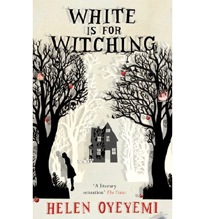White is for Witching is the third novel from the bright,
young and acclaimed Helen Oyeyemi. Keeping to the supernatural theme
of which Oyeyemi is very fond, the story follows the lives of twins
Eliot and Miranda Silver and their father Luc Dufresne, after the
brutal death of their mother, Lily, whilst she is working overseas.
The death of Lily proves to be something
of a Pandora’s Box and as each member of the family try to
come to terms with it, we discover there are some destructive forces
at work to exploit their grief – particularly that of Miranda.
The family home in Dover, Grandmother Anna’s inheritance to
Lily, is also a guesthouse run by Luc. The story is told from multiple
perspectives; that of Eliot, Ore Lind (Miranda’s love interest)
and the House itself, 29 Barton Road. Eliot looks on in painful
astonishment as his sister, an extension of himself and the centre
of his world, wastes away due to anorexia and another peculiar eating
disorder: pica – an appetite for otherwise inedible objects.
Ore befriends Miranda at Cambridge
University only to become fixated with her. As in Oyeyemi’s
debut The Icarus Girl there is something sinister lurking
in the background, threatening to punish all those who come between
it and the focus of its jealous obsession. This time it’s
the House -which has plans to make sure Miranda can never truly
escape its hold on her life, as it has done with the three generations
of Silver females that preceded her.
I approached this novel with fascination.
It was going to be the strongest indicator so far of what kind of
writer Oyeyemi is. Would she once again display the spark of genius
she showed in The Icarus Girl or would she follow the ornate
but desultory path of The Opposite House? The third book
lies somewhere in the middle. All of the good features of Oyeyemi’s
writing remain. Ever a maestro of poetic prose, with Oyeyemi’s
pen, the English language morphs into something greater than the
sum of all its parts. She plucks similes and metaphors from the
air so delightful to read that they perhaps deserve a book all to
themselves. She finds a million and one ways to convey aspects of
the quotidian that would otherwise be dull in the hands of a lesser
writer.
‘...He was old enough to
shave but young enough to still be excited about shaving and thus
meticulous’
‘Sylvie (Luc’s mother) is a black dress, perfumed
scarves, iron posture and whatever else turns a person into an
atmosphere...’
‘...Those first few weeks after Lily’s death...Eliot
noticed Luc more, as an eye does when something is removed from
the picture and the image is reduced to its flaw, the line where
the whole is disrupted...’
However the author is occasionally
too self-indulgent and stops making sense altogether...
‘...The place (Miranda’s psychomantium) was
almost friendly, like being carried on salt water towards yourself...’
Come again?
All three of Oyeyemi’s novels
have certain themes in common. There’s the all-enveloping
influence of strong matriarchal figures – the difference in
WifW being that the influence lies beyond the grave. Once
again Oyeyemi is not afraid to tackle the issue of mental illness
and its link, if any, to the negative supernatural. Miss Oyeyemi
flirted with the subject of eating disorders in The Opposite
House but she gives it her full attention in WifW.
The Pica that afflicts Miranda has
been in her mother’s side of the family for generations; only
to be exacerbated by the death of Lily. Another recurring theme
of all the author’s books so far is that of identity surrounding
one’s ethnicity. Oyeyemi should be highly commended for not
feeling obligated to make the two main protagonists of the same
heritage as herself. She’s not playing it safe and more power
to her. Anglo-Franco Miranda is baffled by Sade, the guesthouse’s
Yoruba maid; her juju concoctions and her enjoyment of Nollywood
which lack artistic merit as far as Miss Silver is concerned.
Like any good writer Oyeyemi can step
out of herself to see facets of her own culture from a different
angle. She can get into the head of a middle-aged European male
as easily as she can that of a teenage African girl. Whichever voice
she chooses to make a comment on contemporary society, she’s
equally convincing. In addition, the author incorporates so organically
her research into the various locations in which the book is set.
The Devon of White is for Witching has experienced a large
influx of refugees from Central/Eastern Europe. One in particular,
Tijana harbours seething resentment towards Miranda and we never
really get to the bottom of it. In truth I think there were some
missed opportunities for Oyeyemi to do something more with this
character.
There is also the presence of Ore,
who Oyeyemi uses as the proverbial stone to kill numerous birds.
She’s of Nigerian heritage but her adoptive parents are the
very English Mr and Mrs Lind, from Kent. Ore appears to be resentful
of her Nigerian roots perhaps because it is this factor that makes
it so glaringly obvious that she is not the biological child of
her parents. Eliot, like his sister (the two being of like mind)
is magnetised by the stunning Ore; alas she is only interested in
romancing fellow females – such as Miranda. Miranda herself
is going through that moment in her teens when she’s deciding
which of the sexes float her boat. There are even allusions to incestuous
feelings between her and Eliot.
This is a rather cynical approach to
the relationship by the author and buys too much into the theory
that a man and a woman cannot be close without sexual tension. Again,
struggling with sexuality is a theme Oyeyemi has explored in her
previous book. However trying to make Ore a walking embodiment of
all western social minorities reads too much like a gimmick. Up
until when Miranda goes off to University and Miss Lind makes an
appearance in earnest, WifW is at times a very engaging,
fluid read. However Miranda and Ore’s romantic entanglement
slows things right down, adding little to the story and an unnecessary
distraction. It is clear that Miranda had some, albeit inadvertent,
supernatural influence over Ore but this effect could have been
achieved if the two girls were merely close friends.
Not since her first novel has Oyeyemi
managed to get the cohesion quite right between the natural and
surreal. In The Icarus Girl the surreal elements of the
book were written in a less self-conscious way. Before you realise
it the reader is drawn into some peculiar incident and Oyeyemi does
it with such dexterity that it seems perfectly plausible. As main
character, Jessamy Harrison, loses a grip on her 8-year-old reality,
so do we. You don’t feel detached from her world because you
are part of it. Perhaps this is because the story leant to the supernatural
more. In both The Opposite House and White is for Witching
it feels like the reader is a lot more distanced from the ‘weird’.
That said, WifW has a more
coherent narrative than its predecessor and is altogether something
of a return to form for Oyeyemi. Everything comes full circle by
the novel’s denouement and in a coup-de-theatre similar to
the film ‘The Sixth Sense’ you are forced to revisit
the beginning of the book to make better sense of what you have
just read. True, you know from the start what happens at the end
but it’s interesting to read how. This redeemed WifW
for me, after it had lost its way somewhere in the middle.
I’m beginning to think Miss Oyeyemi
is a victim of her own success. Right or wrong, I’m still
waiting for her to produce something as accomplished as her debut
which might happen –or it might not. Nevertheless unlike The
Opposite House, WifW has a clearer sense of direction
and most of the main characters are fully formed and rich in depth.
It is undeniable that Oyeyemi is an important voice in contemporary
British literature, one that it will be difficult to ignore. 
|

![African Writing Online [many literatures, one voice]](http://www.african-writing.com/eight/images/logo8.png)









![]()
![]()


